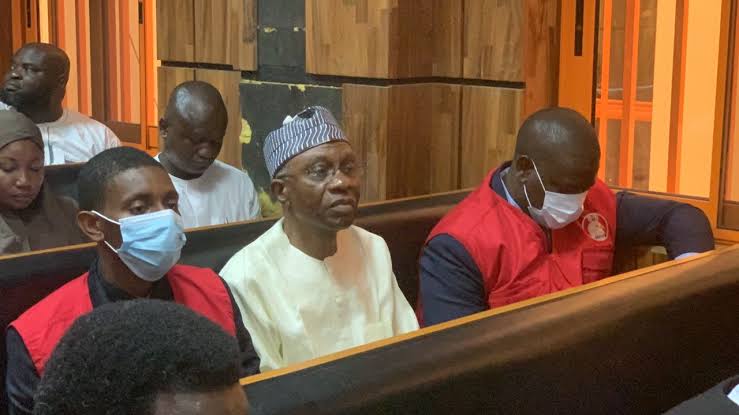People trust leaders who are honest and responsible. When officials are accused of wrongdoing, the law helps to find out the truth and ensure fairness.
This is the dilemma that the former Governor of the Central Bank of Nigeria has found himself.

Embattled former governor of the Central Bank of Nigeria, Godwin Emefiele, has urged the Federal Capital Territory High Court in Abuja to bar the Economic and Financial Crimes Commission (EFCC) from calling additional witnesses after 10 had testified in his ongoing procurement fraud trial.
Emefiele’s lead counsel, Matthew Burkaa, who is a Senior Advocate of Nigeria (SAN), argued that since the EFCC listed only 10 witnesses in the proof of evidence filed in court, it should not be allowed to call more.
However, the EFCC’s prosecuting counsel, Rotimi Oyedepo (SAN), opposed this, stating that additional testimonies were necessary for a fair and thorough case presentation.
Oyedepo maintained that preventing the agency from calling more witnesses would infringe on its right to a fair hearing.
After hearing arguments from both sides on Monday, Justice Hamza Muazu adjourned the case until March 20, 2025, for a ruling.
Charges Against Emefiele
Emefiele is facing 20 counts, including criminal breach of trust, forgery, and conspiracy, under case number FCT/HC/CR/577/2023.
He is also accused of using his position as CBN governor to grant corrupt advantages to April 1616 Nigeria Ltd and Architekon Nigeria Ltd.
During Monday’s proceedings, the EFCC’s 10th witness, Salawu Gana, testified that the contract awarded to April 1616 for vehicle procurement followed procurement laws and CBN guidelines.
People Also Read: Court Dismisses Request By Godwin Emefiele For Medical Trip
Under cross-examination by Emefiele’s lawyer, Gana stated that the CBN Procurement Department evaluated all quotations, vetted the submissions, and awarded the contract to April 1616 because its quotation was the lowest.
He also confirmed that:
Alleged Procurement Fraud
1. Emefiele only approved the contract award based on the CBN Tenders Board’s recommendations.
2. April 1616 supplied the vehicles and was paid accordingly.
3. Emefiele was not a member of the CBN Tenders Board.
4. Neither he nor the five procurement officers involved had been charged by the EFCC.
5. There was no evidence showing that April 1616 paid money to Emefiele.
6. Emefiele was not a director, shareholder, or signatory to April 1616’s bank account.
7. Emefiele did not influence the procurement process in any way.
The EFCC counsel presented bundles of exhibits related to the bidding process for 45 contracts involving April 1616, RT Briscoe, and Globe Motors.
In his testimony, Gana reiterated that April 1616 was awarded the contracts purely based on having the lowest quotations.
How Much Do You Need To Start A Bag And Shoe Business In Nigeria? | Inside Market

